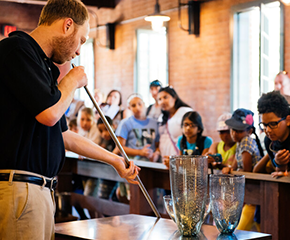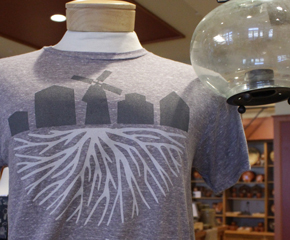
Trade Cards from Early Grand Rapids Businesses
13 artifacts in this set
This expert set is brought to you by:
The staff at The Henry Ford
Trade Card with Menu for Grand Union Cafe, Sunday, December 9th, 1883
Trade card
In 1874, William T. Powers opened Powers' Opera House. Located on Pearl Street, in the heart of the city, it quickly became a popular spot for entertainment. The Grand Union Cafe was located in the Powers' Opera House block and likely served theater guests before and after events. This trade card features the Cafe's menu for Sunday, December 9, 1883.
Trade Card, Foster, Stevens & Co., Carry a Full Line of Roller Skates, 1870-1890
Trade card
After pioneering the hardware trade in Grand Rapids with the company Foster & Parry (1845), Wilder D. Foster became a mainstay in the hardware industry and served as mayor of Grand Rapids three different times. In 1873, Foster formed a new business, Foster, Stevens & Co., offering extensive hardware, house furnishings, and even sporting goods -- including roller skates, as mentioned here.
Trade Card for Gourlay Brothers & Co., Shirt Makers and Importers Men's Furnishing Goods, 1875-1890
Trade card
During the 1850s, the ready-made clothing industry expanded rapidly. With the introduction of sewing machines, garments like men's shirts could be made much faster than by hand -- with factories turning out many hundreds of shirts daily. Gourlay Brothers & Company was established in Detroit in 1875 by Scottish immigrants Alfred and James Gourlay. A successful men's shirt manufacturer, they expanded to the growing city of Grand Rapids.
Trade Card for Chase Brothers Pianos, Chase Bros. Piano Co., 1889-1900
Trade card
The Grand River provided many benefits to businesses in Grand Rapids. In fact, the Chase Brothers Piano Company moved its operations from Richmond, Indiana, to the city in 1884 because the river offered superior shipping capabilities. Specializing in "artistic" grand pianos, as well as upright pianos, Chase Brothers Piano Company was highly respected for the fine craftsmanship of its instruments.
Trade Card for Harvey & Heystek, 1893-1900
Trade card
Harvey & Heystek opened in 1885 as a partnership between Kent County Clerk Cornelius Harvey and Henry Heystek, an energetic businessman. The pair sold "wall paper and window shades, paints, oils, and picture frames, etc." In operating what was considered to be an honest business, Harvey and Heystek became leaders in their industry in Grand Rapids.
Trade Card for Granite Ironware, St. Louis Stamping Co., "For Kitchen and Table Use," 1884
Trade card
In the 1860s, William Gunn established the Gunn Hardware Company. Along with manufacturing tin and sheet iron, the company offered a variety of builders' tools and hardware. In addition to these, the company sold house furnishings, like cooking and heating stoves, as well as kitchen equipment, including granite ironware -- that is, metal products coated with enamel that resembled granite.
Trade Card for Clothing, Tower Clothing Co., circa 1885
Trade card
Joseph W. Rosenthal established the Tower Clothing Company in 1887 after purchasing the store and inventory of E.S. Pierce's Great Wardrobe. Located in the heart of the growing city of Grand Rapids, the successful Tower Clothing Company specialized in men's and boys' ready-made clothing and accessories. Rosenthal's window displays advertised the many options available for men and boys, garnering the attention of passersby.
Trade Card for Calla Lily Roller Flour, Star Roller Mills, 1880-1900
Trade card
By the late 19th century, flour milling became a successful industry in Grand Rapids. In 1875, entrepreneurs Carl Voigt and William Herpolsheimer purchased Star Mills, later renaming it Star Roller Mills after adopting roller mill machinery to produce a finer, whiter flour. With this, the mills gained a more national reputation. This trade card features directions for making bread using the company's popular brand, Calla Lily.
Trade Card for Triumph Corn Planter with Pumpkin Seed Attachment, A. C. Kent Company, circa 1885
Trade card
In 1872, Arthur C. Kent patented and manufactured the Kent Triumph hand corn planter and soon his company, the A.C. Kent Company, became one of the most successful agricultural equipment manufacturers of the 19th century. Kent's equipment was sold across the country by regional and city retailers -- including the establishment of Samuel Fox, which sold agricultural implements and carriages in Grand Rapids.
Trade Card for Men's and Boy's Clothing, Star Clothing Cooperative Co., 1880-1900
Trade card
In 1868, Isaac and Henry Levi established Star Clothing House, selling men's and boys' ready-made clothing and accessories. By 1860, the ready-made clothing industry offered males a range of garments to choose from, while women's fashions required more fitting. On July 24, 1880, Star Clothing House became one of the commercial buildings lit by electric lights generated by the Grand Rapids Electric Light and Power Company.
Trade Card for the Household Sewing Machine Company, 1895
Trade card
Beginning in 1873, the Providence Tool Company in Providence, Rhode Island, manufactured Household brand sewing machines. When the company moved to Dayton, Ohio, it was renamed the Household Sewing Machine Company and remained in business until 1906. Trade cards advertised the company and sewing machine, which was sold by small retailers across the country, including at S.N. Bates' store in Grand Rapids.
Trade Card for Matchless Flour, Valley City Milling Co., 1894-1923
Trade card
The Valley City Milling Company was founded in 1884 in Grand Rapids. It sold flour under brand names such as Snowflake, Matchless (seen here), and its most popular brand, Lily White. Following a fire in 1923, the company moved to Portland, Oregon, where it became a successful dog food producer. The Grand Rapids Public Museum is currently located where the company's mills once stood.
Trade Card for Quick Meal Gasoline Stoves, 1882-1901
Trade card
The Quick Meal Stove Company, founded in 1881 in St. Louis, Missouri, became known as American Stove Company (and later Magic Chef) in 1901. It gained notoriety in the late 1910s as the first to offer the Lorain oven heat regulator -- forerunner to the temperature dials we see today -- ensuring consistent and accurate oven temperatures. Quick Meal brand stoves were sold across the country, including at Vanderveen & Witman in Grand Rapids.


